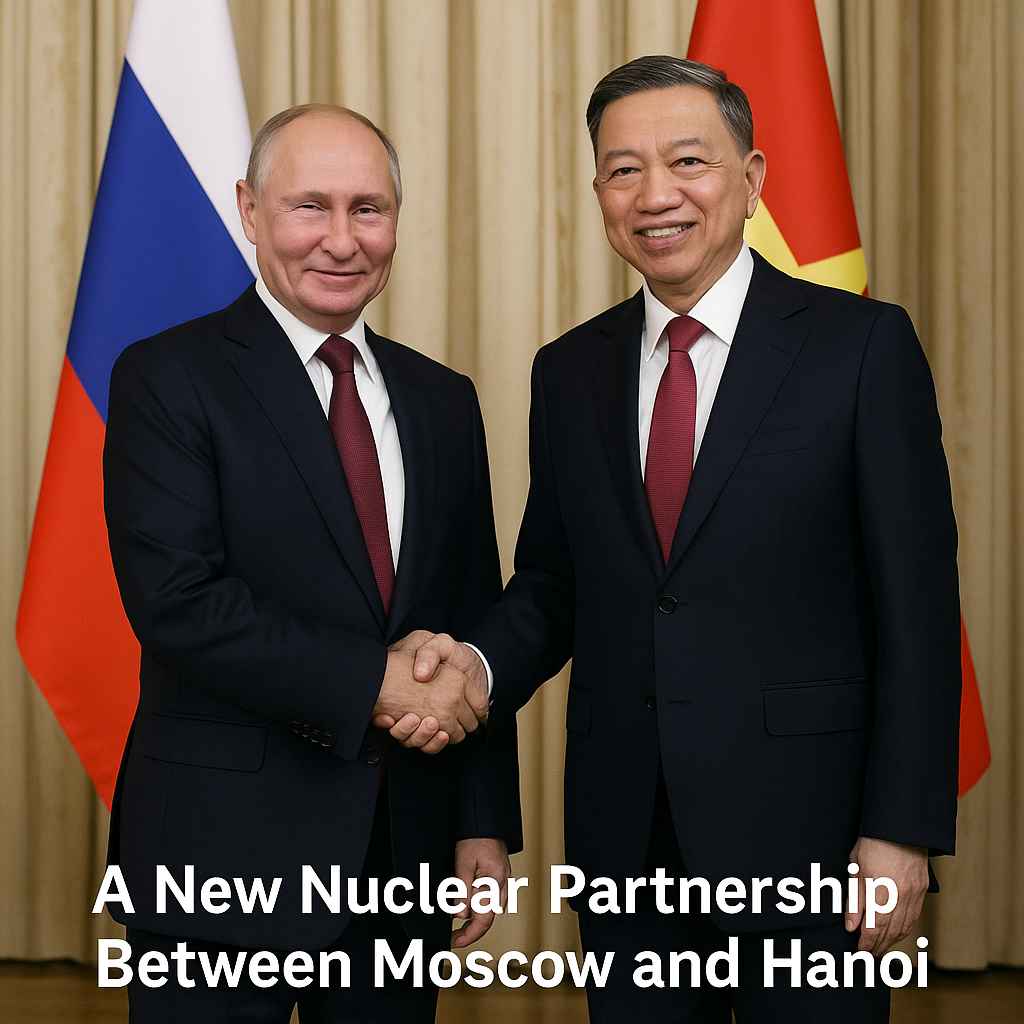On May 11, Russia and Vietnam announced a major step forward in their long-standing relationship. The two nations decided to start talks on building nuclear power plants in Vietnam.
A New Nuclear Partnership Between Moscow and Hanoi
This announcement was made in a joint statement during a high-level visit by Vietnam’s Communist Party General Secretary To Lam to Moscow. He was there to attend Russian President Vladimir Putin’s Victory Day celebrations on behalf of Hanoi.
The agreement states that the nuclear plants will be built using advanced technology. Both governments promised that all work will strictly follow safety rules for nuclear energy and radiation. These rules are meant to protect both people and the environment. According to the statement, the main purpose of the project is to support Hanoi’s goals for social and economic development.
Hanoi has made it clear that it wants to increase the amount of electricity it produces. The country is growing quickly and needs more energy to keep up with new factories, homes, and businesses. It intends to accomplish this, in part, through nuclear energy. Even though nuclear power can be risky, it also produces a large amount of electricity without polluting the air.
Russia, which has strong experience in nuclear energy, is one of Hanoi’s oldest allies. When the Soviet Union supported North Vietnam during the Vietnam War, their connection began. These strong historical relations have helped both countries maintain cooperation in many fields, including energy, defense, and trade.
As Hanoi continues to look for long-term energy solutions, this partnership with Russia reflects a deepening of strategic ties rooted in shared history and mutual interests.
Vietnam Marks Peace, But Its Friends Speak Volumes: U.S. on Edge as China and Russia Take the Stage
Vietnam’s Search for Multiple Partners in Energy
Vietnam had earlier said that it was open to working with several countries to build its nuclear power stations. They included the United States, South Korea, Japan, and France. But now, Russia appears to be the front-runner in this effort. In fact, this is not the first time Russia has expressed interest in helping Hanoi with nuclear technology.
President Putin had been to Hanoi in June 2024. During that visit, the two countries signed over ten documents. One of those included a plan to build a nuclear technology center in Vietnam. That agreement helped lay the groundwork for the latest announcement on May 11, showing the growing importance of nuclear cooperation between Moscow and Hanoi.
Hanoi intends to open its first nuclear power facility between 2030 and 2035. The country sees nuclear power as an important part of its future energy mix. It hopes that this energy will help support its expanding industries and improve the quality of life for its people.
The partnership with Russia does not mean Hanoi is closing the door on other countries. The government has repeatedly said it wants to keep its options open. However, the current step with Russia signals a deeper level of trust and cooperation between the two nations.
Vietnam’s Boldest Break: F-16 Deal Marks Dramatic Split from Russia’s Fading Grip
Energy and Oil Trade Strengthen as War Impacts Russia
The joint statement between Moscow and Hanoi also mentioned other energy-related plans. Russia and Vietnam have reached an agreement to expand their shipments of LNG and crude oil. At the same time, Vietnamese oil companies will be allowed to operate more in Russia. This shows that both countries are working together not just on nuclear power, but also on fossil fuels.
These deals come at a time when Russia is facing tough economic challenges. Russia has been subject to severe international sanctions ever since it began its full-scale invasion of Ukraine. Western countries have tried to limit Russia’s ability to sell its oil and gas by cutting off financial and trade links.
One major event took place on January 1, when Ukraine stopped allowing Russian natural gas to pass through its land. This move cut off Russia’s access to a large part of the European market. As a result, Russia has been looking for new countries willing to buy its energy, and Vietnam is one of them.
Artillery and Aggression: Russia’s Military Surge Near NATO Borders
Regarding the confrontation between Russia and Ukraine, Vietnam has maintained its neutrality. It still trades with both and has not taken sides. This balanced approach has helped it maintain good relationships with a wide range of countries, including Russia.
By building stronger energy ties with Vietnam, Russia hopes to make up for the losses it is facing in Europe. At the same time, Vietnam gets access to more energy and more business opportunities for its own companies. This growing partnership now includes nuclear power, oil, and natural gas, making it a significant development in Asia’s energy landscape.

